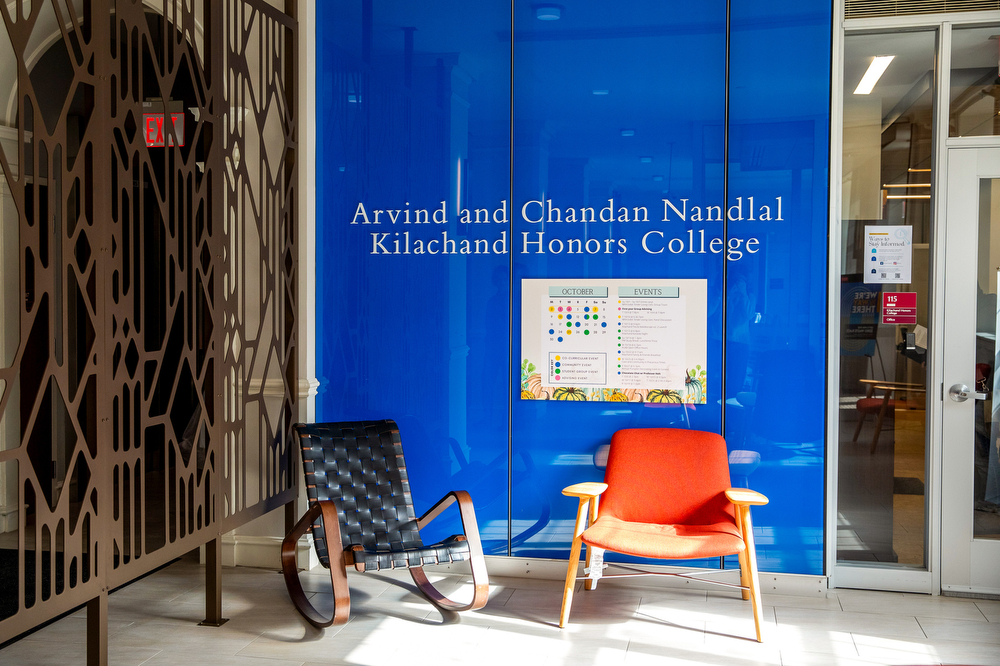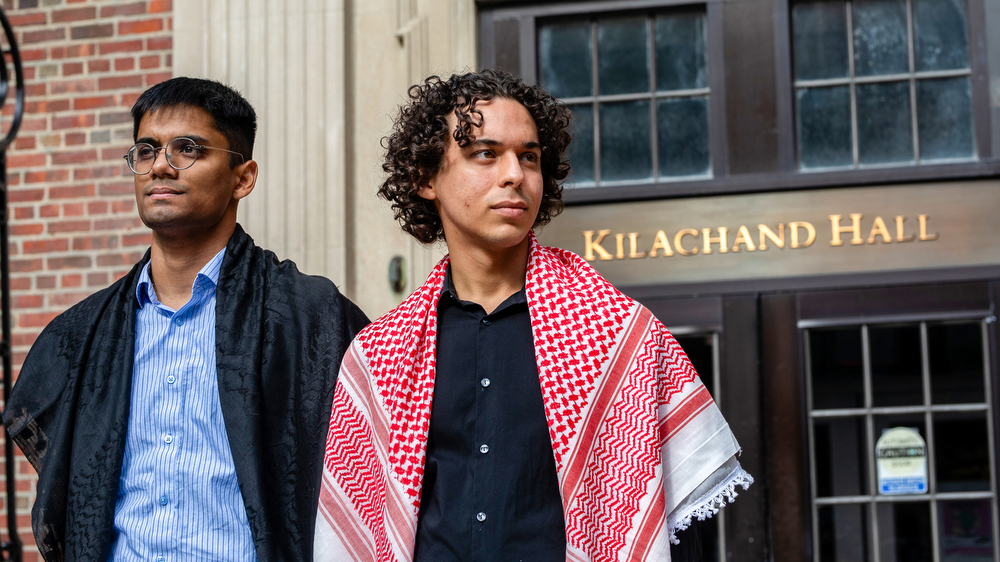By Maria Pemberton and Kiera McDonald
Students in Kilachand Honors College boycotted their Kilachand-affiliated classes this week in response to Kilachand Director Melissa Holt’s comments on the recent violence in Israel and Gaza.

Faisal Ahmed, a senior in the College of Arts and Sciences and Kilachand, and Adam Shamsi, a senior in CAS, organized the boycott for all Kilachand students on Sunday, urging them to not attend Kilachand-affiliated classes until Holt issued a new statement.
Faisal Ahmed, a senior in the College of Arts and Sciences and Kilachand, and Adam Shamsi, a senior in CAS and Kilachand, organized the boycott for all Kilachand students on Sunday, urging them to not attend Kilachand-affiliated classes until Holt issued a new statement.
Last Tuesday, Holt sent an email with the subject “Events in Israel”’ to Kilachand students. The email offered condolences for those affected by the Hamas attacks on Israel and highlighted University resources, such as BU Hillel and BU Student Health Services.
“The attacks on Israel over the weekend were horrifying and heartbreaking. Many Boston University students have been directly affected by these events,” Holt wrote in the email. “Others, even if not directly affected, have watched videos of the horrific events unfolding — of murders and kidnappings and buildings collapsing — images that bring sharply to light the high human cost of the attacks.”
Ahmed expressed dissatisfaction with Holt’s statement.
“I don’t think she did a good job of reaching out to all students, which seemed to be her intention of expressing support to all students who are grieving or experiencing loss in that moment,” Ahmed said.
Ahmed and Shamsi reached out to Holt and expressed their concerns regarding her email. Holt then sent out another email Tuesday.
“I want to make it clear to the KHC community that we condemn the attack by Hamas on the State of Israel,” Holt wrote in a follow-up email. “And, I recognize that this occurred within the broader historical context of the Israel-Palestine conflict, and that the resulting war will result in harm to all.”
In the second email, Holt also promoted a Chocolate Chat — a weekly opening of her office to discuss current issues — and invited Kilachand students to “discuss the events in the Middle East.”
Ahmed said this Chocolate Chat went “pretty positively” and created a space where all students felt supported and heard, which the email failed to do.
However, Ahmed said he was still unsatisfied with Holt’s response and claims that he emailed Holt back about her failure to offer support to a wider group of students.
“Why can’t you just send an email that puts it in context about exactly what you’re referring to?” Ahmed said. “People mourning the loss of innocent Palestinian lives, let them know that Kilachand is there for them and supports them.”
Ahmed and Shamsi made three requests that Holt abide by in a subsequent email to the Kilachand community: “a formal apology to those afflicted by Israel’s attacks on Palestinian civilians, acknowledging their need for on-campus support and how the earlier statements neglected those needs,” “a statement condemning the state of Israel’s ongoing illegal occupation of Palestinian territory which has led to the displacement of millions of people and the deaths of thousands over several decades,” and “a direct statement of support on behalf of KHC administrators towards students affected by Israel’s attacks on Palestinians with indications of resources available to those students as well.”

Shamsi and Ahmed also wrote a document outlining the “shortfalls” in Holt’s email.
“A statement is vital because it can bridge the gap between silent suffering and feeling seen,” they wrote in a document attached to the email. “It’s reassuring that their pain is recognized, their voices are heard, and their experiences matter.”
Following the announcement of the boycott, Nathan Phillips, professor of earth and environment, and Anna Henchman, associate professor of English, opted to cancel their Kilichand class on Tuesday in favor of a student-centered space on the Charles River.
“We teach in this class about things like mutual aid in a time of climate or other times like acute disaster situations,” Phillips said. “We felt it was fitting to exemplify that in the way we held space today for our students.”
Henchman described a specific effort to create support outside of the academic environment.
“We needed to change the space because there’s a time and place for intellectualizing and analyzing problems,” Henchman said. “We felt like it was important to prioritize supporting students no matter where they were from.”
Berit Schaus, a sophomore in the College of Engineering, said the cancellations provide students a chance to “sit and reflect.”
“I was glad that … the professors of the class had the students’ back on the issue,” Schaus said. “Some people that I talked to were hesitant to participate in the boycott because there are potentially academic consequences.”
Rima Khaja, a sophomore in the Sargent College of Health and Rehabilitation Sciences, said the cancellation of classes may have taken power away from the students’ boycott.
“I definitely have heard some people say how canceling class may have disrupted the whole point of a boycott,” Khaja said. “Personally, I think that cancelling the class was a fine move because it respected peoples’ rights to protest.”
Avishai Lean, a junior in ENG and Kilachand, said he has family in Israel who were directly impacted by the terrorist attacks and he found the resources in Holt’s email to be “helpful.”
“When she sent that email out it let me know that there were people in the Kilachand community that cared,” Lean said. “I think that the email that they sent out was not very political, nor very biased to say that the attacks on Israel were horrifying and heartbreaking.”
Lean said Palestinian students should receive resources on campus but disagrees with the boycott because he feels like it is “an attempt to justify the terrorist attack on Oct. 7.”
“I don’t agree with their sentiment behind why they’re boycotting,” Lean said. “I think that they’re trying to equate the terror attacks to military actions involved in a political war, which I don’t think is a fair comparison.”
In response to the boycott, Holt sent out a third email to students Thursday and apologized, writing, “it was not my intent to minimize the need for support for all students.”
Holt provided a list of resources in her email including The Palestinian Community in Boston, The Howard Thurman Center, Islamic Society of Boston and Boston Young Muslim Professionals.
“We are navigating an incredibly difficult time,” Holt wrote. “My hope is that we can reaffirm our commitment to support and care for one another.”
Following Holt’s apology, Ahmed and Shamsi declared a formal end to the boycott in an email titled, “Thank You for Your Activism.” The email expressed gratitude for the solidarity of students and professors and announced that their demands were met including, “an apology; an acknowledgment that both our Palestinian and Israeli students’ lives matter; resources available to individuals on either side of the war; and a commitment to sending educational resources that show the historical origins that led to the occupation as it is today,” Ahmed and Shamsi wrote.
BU spokesperson Colin Riley said the University is ensuring support for students through services such as crisis counseling, behavioral medicine and assistance through Marsh Chapel.
“Let’s hope that we have some peace soon,” Riley said. “The University is there to support them through this truly terrible situation.”























































































































